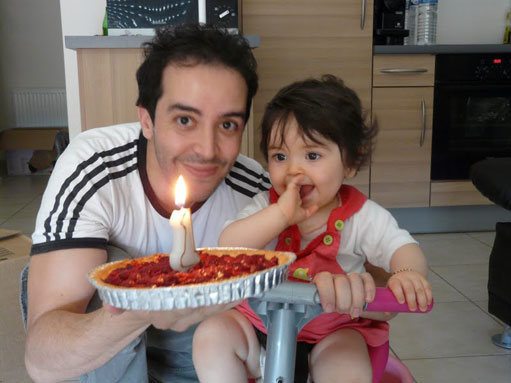
ATLAS e-News
23 February 2011
20 October 2009
Nabil Ghodbane
Nationality: Algerian

Nabil Ghodbane and daughter Kahina
Looking back, as he can now, from a position of maturity, Nabil Ghodbane is a little embarrassed about the scene that unfolded when he met Peter Higgs. “At the time, I was maybe a bit naïve,” he admits bashfully, as he recounts a tale of waiting outside the toilets after a Scottish summer school talk to greet Professor Higgs on his way out. “We were like groupies!” he laughs at himself and other students who stampeded the reluctant physics celebrity.
Time and experience may have left Nabil a more composed man, but even now, it’s clear how much the encounter inspired him, and how much the autograph Higgs gave him – “With best wishes, Peter Higgs,” he beams – meant to him. “When you’re a student, and you meet these key people… Wow. You really want to stay in the field afterwards.”
And that isn’t always a given. Now in his ninth year as a post doc, Nabil is facing a problem that many face: securing a permanent position is tough. He is quick to praise aspects of the particle physicist’s working environment, pointing out that his peers are open-minded, international, intellectual and highly motivated. “This field is very challenging – meeting people who judge you for the ideas that you bring is very nice,” he says, “but at the same time it’s very hard, going from short contract to short contract.”
Indeed, concerns about whether or not one might still be employed six months down the line are arguably something of a distraction from the intellectual demands of the job. “I like the challenges of this field. I learn a lot every day … and you can always move [to a new area] if you get bored,” Nabil says. He currently works on jet algorithms and top physics with Clermont-Ferrand, but he has previously spent time on SUSY physics, building time projection chamber hardware, and investigating the physical properties of manufactured diamonds.
But feeling like a student in terms of learning is indisputably much more fun than feeling like a student in terms of financial stability. “I think our group leaders and big bosses here are aware of the problem, but you have to be realistic at some stage,” Nabil concedes. “I’m staying in this field now for one reason – to see the data. But afterwards, I have to think seriously. I have a family to take care of.”
Nabil’s 15-month-old daughter, Kahina – named after a North African tribal queen – is the apple of her father’s eye. Between the ages of six and ten months, he worked from home, looking after Kahina while his French wife, Sophie, a freight engineer, went out to work. “This field is very nice for that,” he says of the flexible and understanding approach of his co-workers. In between contributing to meetings over the Internet and writing from his home desk, he was able to catch some of his daughter’s precious firsts that he might otherwise have missed.
Of course, Nabil’s premier aim is to find a permanent academic position with a lab or university but if it does come to leaving the field in the future, one avenue he may pursue is teaching. He already tutors German students from the local International School, in physics and mathematics, because he enjoys meeting foreigners and likes to practice his German. He also speaks English, Arabic, Chaoui – a dialect spoken in his native northeastern Algeria, and French (“I think in French”), but is resolutely modest about his linguistic proficiency.
Nabil moved to France with his mother and brother when he was seven, wrote his PhD at Lyon (on the Delphi experiment), married a Frenchwoman, and lives there again now, almost 30 years on. But in between times, he has already spent five years living in Germany, either side of a CERN fellowship; three years at DESY in Hamburg and two years at MPI Munich, the city where he met his wife. He speaks particularly fondly about the country and its inhabitants, proclaiming that the negative stereotypes about them being socially frosty are rubbish, while the positive stereotypes about their methodical, efficient working practices hold more than a grain of truth.
Although the place that he calls home has varied geographically, one thing is for certain: "Home to me is where my daughter is. I have my home now." Like many post docs, the future is still unclear for Nabil, but he remains optimistic, convinced for now that he has made the right choice in pursuing high energy physics.
Nabil is one of the several Algerians within the ATLAS
collaboration. He became a member of ATLAS in 2003 and wishes, along with many
other Algerians involved in the HEP field, that Algeria, like Morocco,
will join the ATLAS collaboration.

Ceri PerkinsATLAS e-News
|